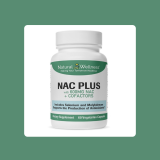

If you or a loved one has ever researched how to support the liver naturally, information about milk thistle likely surfaced repeatedly. While there is plenty of evidence connecting milk thistle use to improvements in liver health, many are unaware of this herbal supplement’s other potential benefits.
For more than 2,000 years, milk thistle has been a respected herbal remedy for a variety of health ailments. A plant native to the Mediterranean region, milk thistle is a member of the asteraceae family, which also includes sunflowers and daisies. Its active ingredient is silymarin, a compound extracted from milk thistle seeds. Silymarin is a flavonoid, which experts believe is behind milk thistle’s many healthful properties – such as protecting and strengthening liver cells, being a potent antioxidant and acting as an antiviral and anti-inflammatory agent.
Milk thistle’s role in supporting and protecting the liver is widely known. Milk thistle:
- Reduces inflammation and scarring in the liver – partly due to its anti-inflammatory properties.
- Strengthens liver cells – preventing free radical damage.
- Deflects damage by toxins – silymarin inhibits the binding of toxins to liver cell membrane receptors.
- Increases glutathione – a powerful antioxidant that is needed for liver detoxification.
- Encourages new liver cell growth by stimulating protein synthesis.
However, milk thistle’s value to the human body does not end with the liver. This invaluable herb has other desirable characteristics.
5 More Very Good Reasons to Supplement with Milk Thistle
- Cancer – There are no claims that milk thistle can cure or prevent cancer. However, studies have demonstrated anti-cancer effects for the following types: prostate cancer, tongue squamous cell cancer, breast cancer, cervical cancer, colon cancer and leukemia. Experts believe milk thistle’s value for cancer prevention is via boosting the immune system, fighting DNA damage, reversing cancerous tumor growth and inhibiting the binding of toxins to cell membranes.
- Brain – Milk thistle is protective of the nervous system, including the brain. Research suggests milk thistle can benefit those with multiple sclerosis and Parkinson’s disease. In addition, silymarin appears to reduce brain plaque formation – which could prevent or delay Alzheimer disease development.
- Diabetes – A growing body of research is demonstrating that silymarin can help decrease blood sugar levels in those with diabetes and those with insulin resistance – a precursor to diabetes. Researchers hypothesize this is because of milk thistle’s ability to support and improve liver function. The liver plays a role in producing and regulating hormones. Insulin is a hormone and when released into the bloodstream, it lowers blood sugar levels.
- Kidneys – Besides benefitting the liver, milk thistle appears to have a similar impact on the kidneys. A 2010 study found that milk thistle protected against diabetic nephropathy (a complication of diabetes in which the filtering ability of the kidneys is impaired) by increasing activity levels of the enzymes catalase and glutathione peroxidase; both of which protect kidney cells. In addition, milk thistle shows promise for stimulating cellular regeneration in the kidneys.
- Cardiovascular – Because it is a potent anti-inflammatory substance, milk thistle is extremely valuable for maintaining cardiovascular health. Inflammation within blood vessels is believed to be the primary cause of heart disease; thus, reducing blood vessel inflammation with milk thistle is advised to anyone at risk. In addition, milk thistle’s assistance in liver detoxification helps purify the blood, which reduces the risk of blood vessel damage.
Supplementing with milk thistle is a wise choice for preventing certain types of cancers and diabetes, as well as supporting liver, kidney, cardiovascular and brain health. However, all milk thistle supplements are not created equally. This is because milk thistle is difficult for the body to absorb since it does not easily cross cell membrane barriers. Although, when silymarin or silymarin’s most beneficial component, silybin, is bound to a phosphatidylcholine complex, it can then easily cross cell membrane barriers. Studies have shown that milk thistle in these forms, known as a silymarin phytosome or silybin phytosome, are up to ten times more effective than a standardized milk thistle supplement.
Maximum Milk Thistle® vs. UltraThistle®
Both Maximum Milk Thistle and UltraThistle contain a patented form of milk thistle that combines silybin and phosphatidylcholine at the molecular level, making them the most absorbable and effective forms of milk thistle available. For those looking to maintain a low level of inflammation throughout the body and prevent the ailments just described, Maximum Milk Thistle is an ideal choice. Individuals who already have an abundance of inflammatory cascades in their body and are aiming to prevent a chronic illness from worsening, the highest dosage available of the silybin phytosome is in UltraThistle.
Few single herbs benefit so many different aspects of our health, with milk thistle being an exception. Besides providing a dynamic approach to liver support, supplementing with the potent and highly absorbable silybin phytosome can protect your cardiovascular system, your brain and your kidneys while simultaneously helping with blood sugar stability and cancer prevention. Depending on your current state of health, there are many reasons to use Maximum Milk Thistle or UltraThistle to ensure and prolong your wellness.
Editor’s Note: Not interested in milk thistle? Natural Wellness’ Ubiquinol CoQ10 promotes heart, brain, kidney, liver and immune system health and function. It’s highly recommended for those on a statin, since statins lower CoQ10 levels by as much as 40%.




